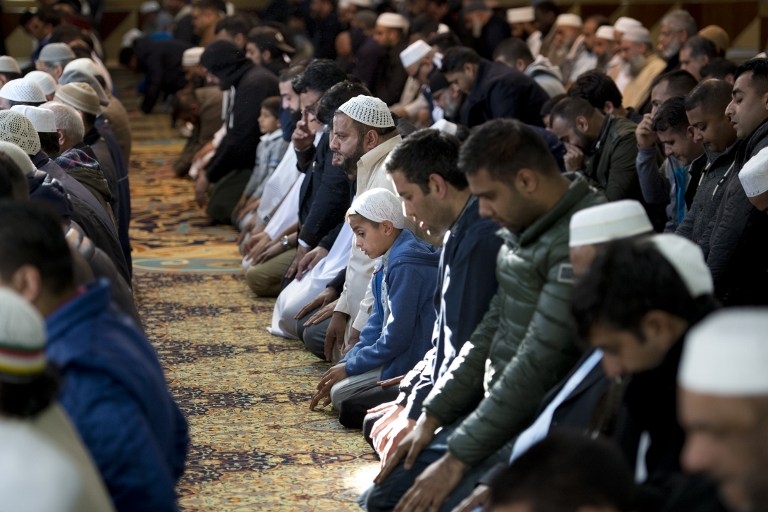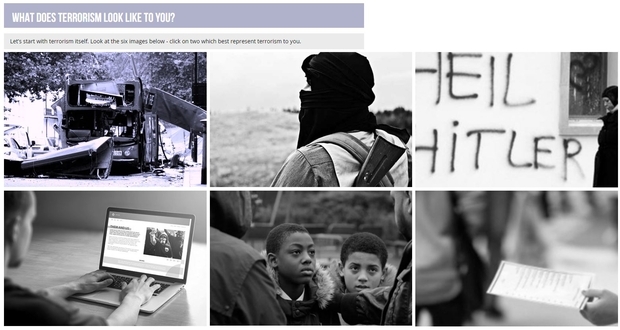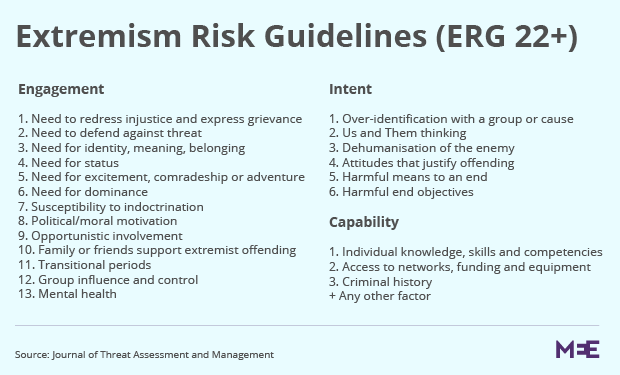UK's Prevent strategy alienating Muslim communities, report warns

The UK government's Prevent counter-extremism strategy is counter-productive and has led some Muslims to question their place in British society, a new report on Wednesday warned.
The study by the Open Society Justice Initiative also found that the requirement on public sector professionals to identify individuals deemed at risk of being drawn into terrorism had created a serious risk of human rights violations and discrimination in the everyday lives of British Muslims.
It called on the government to repeal the 2015 Counter-Terrorism and Security Act in which the "Prevent duty" became a statutory obligation for teachers, doctors and even nursery childcare workers, and said the duty had resulted in over-referrals.
Drawing on interviews and case studies, it said that even children had been reported to Channel, a police-led counter-radicalisation programme within Prevent, for expressing political views, and that some Muslims appeared to have been targeted for displaying signs of increased religiosity.
'There are serious concerns that the Prevent strategy is counterproductive because its erroneous targeting of individuals who are nowhere near being drawn into terrorism may make them more susceptible to that path'
Open Society Justice Initiative
In one case a 17-year-old boy, Taufiq, was questioned by police from Birmingham's counter-terrorism unit after being referred to Prevent by his college.
The allegations against him included claims that he had become more religious and had started to wear a thawb.
When the teenager went on a short trip to deliver aid to refugees in the French port of Calais, police called his parents and told them that they believed he had gone to Syria, despite the fact that by then he had returned home and was in his bedroom.
Police then visited the family to check this was the case.
“There was no other reason for subjecting Taufiq to this other than the fact that he was a Muslim. If he was dressed in black and wearing eyeliner, they wouldn’t have gone after him. Muslim kids are not afforded the same opportunity of rebelling as white kids are,” the family's lawyer said, adding that the family had lost trust in the government and the police.
“Taufiq is a sweet little boy. He is lucky in that he has a strong family unit to keep him grounded. Had he not had that, something like this could push someone into the hands of terrorists .... You have created a problem where there was no problem.”
Launching the report at a parliamentary event on Wednesday evening, Amrit Singh said that an 80 percent error rate in Channel referrals indicated that something was seriously wrong with Prevent.
"Parents are concerned their children's futures are being tainted by the records Prevent is producing day after day," said Singh.
Yasmin Qureshi, an MP for the opposition Labour Party, called for the strategy to be rethought while Lucy Allan, an MP for the governing Conservative Party, also spoke out against the impact of the policy.
"We should be able to leave our children in daycare or school without worrying about what they might say," she said.
But William Baldet, a Prevent co-ordinator in Leicester, said that the portrayal of Prevent in the report was "unrecognisable compared to the Prevent we deliver".
Dinner lady accused of supporting IS over halal meal concerns
In another case, a dinner lady at a school in Lancashire was reported to Prevent on suspicion of being a supporter of the Islamic State group after she had raised concerns about the way in which halal meals were being prepared for Muslim students in the school kitchen.
In the healthcare sector, Prevent also risked undermining the relationships between doctors and their patients, the report said, because it put pressure on doctors to breach their duty of confidentiality.
It cited the case of a teenager questioned by his doctor about his political views; he was subsequently harassed by police because his father ran a charity sending aid to Syria.
"There are serious concerns that the Prevent strategy is counterproductive because its erroneous targeting of individuals who are nowhere near being drawn into terrorism may make them more susceptible to that path," the report concluded.
"Prevent is also causing some wrongly targeted British Muslims to question their place in British society and may engender the very 'Them and Us' mentality that Prevent treats as an “indicator” of vulnerability to terrorism."
The report also questioned the scientific basis of the strategy, and said that the government's efforts to define and prohibit so-called non-violent extremism were structurally flawed.
Last month the Royal College of Psychiatrists called on the government to publish a secret study on which the Channel programme's Vulnerability Assessment Framework criteria, a list of 22 factors claimed to contribute to radicalisation is based. The Royal College's call comes amid concerns that the study had not been subjected to peer review and scientific scrutiny.
UK extremism screening for kids adapted from tests for convicted terrorists
The report noted that some of the vulnerability factors such as "the need for identity, meaning and belonging; a desire for status; and desire for excitement and adventure" were "so widely prevalent so as to capture virtually every young person within the net of "vulnerability'".
The government has refused to release the study, which is based on interviews with prisoners convicted of terrorism offences, on the grounds of national security.
“To effectively counter the real threat of terrorism, the government must let health and education professionals get on with their jobs and use their common sense and professional judgement to intervene where genuinely warranted,” said Amrit Singh, senior legal officer for national security and counterterrorism at the Open Society Justice Initiative and the report's author.
“Conscripting these professionals to counter a vaguely defined concept of 'extremism' under a statutory duty is only making things worse by violating human rights, generating fear and distrust, and alienating Muslim communities while undermining their access to health and education.
“The government and health and education bodies should heed the voices in this report and abandon the flawed aspects of the Prevent strategy.”
The report also cites concerns about the quality of Prevent training for public sector professionals and the extension of training to taxi drivers, as reported exclusively by Middle East Eye.
'Where to Guv, Raqqa?' UK taxi drivers get Prevent training
The Open Society Justice Initiative, which funded the study, is part of the New York-based Open Society Foundations network founded by billionaire investor and philanthropist George Soros.
The report is the latest in a series by human rights organisations, campaign groups, parliamentary committees and opposition political parties calling on the government to abandon or reform the Prevent strategy.
Advocates of Prevent argue that it is safeguarding individuals vulnerable to being drawn into extremism and terrorism, and has made a positive impact on thousands of lives.
The Home Office says that “Prevent is working” and that more than 550,000 public sector workers have been trained to spot signs of radicalisation.
Security Minister Ben Wallace told MEE: "The threat from radicalisation, both Islamist and extreme right wing, is very real. Helping to protect those vulnerable to radicalisation is challenging but absolutely necessary work. It is disappointing to see conclusions that risk damaging work that is absolutely essential to keeping vulnerable people safe from extremism and terrorism.
“The findings contain inaccuracies and lack balance. They take no account of the severe nature of the terrorism threat and nor do they offer any solutions for how we protect vulnerable individuals.”
David Anderson, the UK's independent terrorism legislation watchdog, told BBC radio earlier this month that he expected the government to announce its plans for the future of Prevent within weeks.
Meanwhile, the Muslim Council of Britain, an umbrella group of Muslim organisations, said on Wednesday it planned to launch an alternative grassroots-led counter-radicalisation programme.
"In reflecting the wishes of a cross-section of British Muslim society, our affiliates have directed the MCB to explore a grassroots-led response to the challenge of terrorism. Real challenges exists, as we see with Muslim families broken up as a number of children, mothers and fathers leave to travel to Syria,” the MCB said in a statement to the Guardian newspaper.
New MEE newsletter: Jerusalem Dispatch
Sign up to get the latest insights and analysis on Israel-Palestine, alongside Turkey Unpacked and other MEE newsletters
Middle East Eye delivers independent and unrivalled coverage and analysis of the Middle East, North Africa and beyond. To learn more about republishing this content and the associated fees, please fill out this form. More about MEE can be found here.






